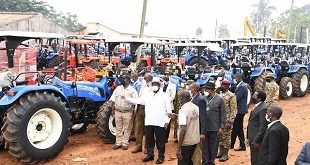
EU, FAO unveils a Shs 33.8 billion project to combat climate change in the cattle corridor
Kampala, Uganda | ISAAC KHISA | The European Union in partnership with the Food and Agriculture Organization has unveiled a new five-year project that seeks to empower Uganda’s rural communities in most vulnerable districts located in the cattle corridor.
The project dubbed Global Climate Change Alliance Plus (GCCA+), now in its second phase (2018 –2023) and with funding of €8 million (Shs33.8 billion) from the EU, will help to scale up agricultural adaptation to climate change in the rural areas, enabling rural households to become more resilient to climate change effects and food insecurity by promoting sustainable and gender transformation actions.
The GCCA+ Project will be implemented in nine districts of the central part of the country’s cattle corridor, including six previous beneficiary GCCA districts of Nakasongola, Luwero, Nakaseke, Mubende, Kiboga and Sembabule and three new adjacent, vulnerable districts of Kalungu, Gomba and Lyantonde.
The new phase of the Project builds upon the successful implementation of the first phase of the GCCA project, implemented from 2012 to 2017, which helped to make Uganda one of the leading countries in Africa undertaking climate change adaptation.
This comes as Uganda’s cattle corridor remains one of the most vulnerable areas to the impacts of climate change characterized by erratic rains, floods, frequent and prolonged droughts.
Earlier, Emmanuel Zziwa, the coordinator for climate change adaption at FAO told The Independent in an interview that the project implementation in the cattle corridor was based on the fact that it was the most affected part of the country with inherent water scarcity for crop growing and pasture scarcity, yet it accommodates over 80% of the ruminant livestock population. He said the cattle corridor supports more than 40,000 heads of cattle per annum.
“This region provides 95 % and 80-85% to the country’s beef and milk production respectively,” he said. “Given that cattle is so much vulnerable, it means that if (drought) is left uncontrolled, there’ will be no milk and beef production in the country.”
EU Ambassador to Uganda, Attilio Pacifici, said climate change impacts on the joint efforts towards sustainable development.
“Actions are urgently needed to preserve and expand key ecosystems such as forests, to use natural resources sustainably and to promote ecosystem services,” he said.
“The action we are launching is complementary to other EU supported initiatives in the sectors of transport and energy infrastructure and agriculture, which are all implemented with the goal of ensuring inclusive and sustainable social, economic and environmental development.”
Some of the interventions in Phase 1 included construction of 15 valley tanks and rehabilitation of five old ones, formation of 168 Farmer Field Schools, with about 4,000 farmer households, establishment of about 700 hectares of bioenergy plantations to enhance sustainable energy production and formation of 400 farmer groups with over 10,000 farmer households.
Phase 1 also witnessed the establishment of 380 plots to demonstrate and promote field adaptation practices for coffee.
GCCA second phase will augment the earlier milestones, this time, targeting more households and more people. It will witness the establishment of six valley tanks that will cater for about 12,000 livestock, distribution of 5,000 energy saving cook stoves, and installation of 300 small scale irrigation schemes benefiting 25,000 people in the nine beneficiary districts, among many other climate change adaptation interventions.
Speaking during the launch of the project at Kalungu District Headquarters on July.03, the FAO Representative to Uganda, Antonio Querido, said there’s need for the country to adapt to and mitigate climate change impacts, because with no action “in the coming decades, climate change will severely affect food production and have other catastrophic impacts depending on our choices as individuals and governments.”
“For Uganda, the next ten years are crucial to make a difference through effective, inclusive and efficient climate change actions. Building the resilience of people and the natural resources base that are adaptive to climate change while leaving no one behind through an integrated response is crucial if we are to succeed in our current efforts,” he said.
Querido revealed that FAO will be working with the Uganda government in the next five years to strengthen national and district knowledge and skills to support agriculture adaption and community resilience to climate change in 33 districts, with financial resources of about US$30 million.
Vincent Ssempijja, the Minister for Agriculture, Animal Industry and Fisheries (MAAIF), urged the local political and cultural leaders to become ambassadors for climate change mitigation and adaptation in their localities by carrying out the basic recommended best practices in agriculture.
“Climate change is real and agriculture is the most affected sector; if our negative actions persist, we will not be able to feed our people,” he said.
”I therefore call upon all leaders to become role models in their areas and advocate for better practices that can stall and address climate change”, he added.
Ssempijja commended researchers under the National Agricultural Research Organization (NARO) for developing improved crop technologies such as high yielding, early maturing and fortified crops such like iron-rich beans. These, he said, are critical for food security in the face of changing climate.
****
Caption:
FAO Uganda Country Representative, Mr Antonio Querido, the EU Ambassador to Uganda, H.E. Attilio Pacifici, the Agriculture Minister, Hon. Vincent Ssempijja. Visit one of the stalls at the launch in Kalungu. (PHOTO/FAO
 The Independent Uganda: You get the Truth we Pay the Price
The Independent Uganda: You get the Truth we Pay the Price



Great work done; I would wish to join the team to enhance resilience of cattle corridor communities through application of food and water innovative approaches given chance.